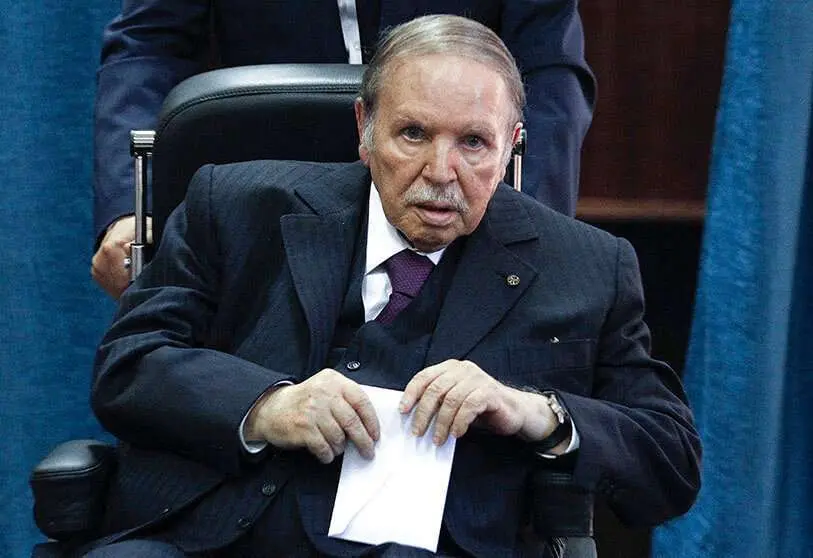Two exits from the stage

In the space of a week, two very different personalities will have disappeared from the political scene, but they are similar in that both were born outside the country they were to govern, both have had great influence in world affairs for many years, and both have coincided in the moment of their departure: Angela Merkel and Abdelatif Bouteflika. The former is retiring after leading Germany democratically for 16 years, and the latter has just died at the age of 84, two years after being ousted from the presidency by the military.
Born of Algerian parents in Uxda, Morocco, something he did not boast about and even hid, Bouteflika was an early fighter in the war of independence against French colonialism, and Ben Bella made him Youth Minister at a very young age, so young that by the age of 26 he had risen to become Foreign Minister, a post he held for many years after supporting Colonel Houari Boumedienne's coup d'état. During this period he was a staunch pro-Green, an ardent defender of oppressed peoples, and made Algeria play a leading role in the Non-Aligned Movement. These were also years of support for the Polisario Front against Morocco (although he later tried to reach an agreement with Hassan II that was thwarted by his own military) and of more or less open complicity with ETA and Antonio Cubillo's MPAIAC. He was then accused of corruption and of diverting funds from the Ministry he headed for his own benefit, and had to go into exile for a few years and spend others trying not to draw attention to himself. It was a time that coincided with the Algerian civil war that cost 200,000 dead and ended for him in 1999 when he ran in the presidential elections, taking advantage of the resignation of other candidates who considered them not very clean. Bouteflika then launched a programme of reconciliation and amnesty for human rights abuses - of which there were many - committed by both sides during the war, won the elections and remained in office for 20 years, "winning" every election that came his way afterwards, even after suffering a stroke that left him severely handicapped and in a wheelchair and forced him to relinquish de facto power in the hands of a circle of highly corrupt family and friends. When he wanted to run for a fifth term as president under these conditions, popular outrage - in the form of massive weekly demonstrations - forced his removal at the hands of the military and intelligence services that have actually ruled Algeria since the very days of independence. And that has not changed today. His death has surprised no one and Algerians now face the dilemma of how to bury him, as Pedro Canales has acutely observed in these same pages: whether to do so discreetly or with the honours of a former head of state while Algeria continues to search for a future that has never quite arrived.
The case of Angela Merkel is very different. Born in what used to be the German Democratic Republic, her austere style visible even in her wardrobe, her critics have accused her of indecisiveness and a reluctant acceptance of Germany's leading role in the European Union, a consequence of being the continent's most populous country and the world's third largest economy. He has also been criticised for putting business above values and, while criticising Putin for his treatment of Navalny or the annexation of Crimea, he did not hesitate to build the Nordstream 2 gas pipeline that makes his country more dependent on Russia. Or that while he criticised China for stifling Hong Kong's freedoms and putting two million Uighurs in re-education camps, at the same time he pushed the EU towards an Investment Treaty with Beijing that was later put on ice by the European Parliament precisely because of human rights concerns.
There are many things in her favour, starting with the fact that she has been a decent and predictable chancellor who has given her country years of stability and growth, which is no mean feat in a world where leaders as erratic and populist as Trump, Johnson, Erdogan, Duterte and Bolsonaro proliferate. Merkel has dealt with three crises with a firm hand during her term in office: in the 2008 crisis she imposed drastic austerity measures on the countries of southern Europe, even if in the end she bailed out Greece... to help her own banking sector; in the COVID crisis she has pushed through a formidable aid package financed by bonds issued by the European Commission; and in the Syrian refugee crisis it set an example of defending our values in the face of the selfishness of other European countries.
Die Welt says that next Sunday's election is the most boring in decades because it is being contested by candidates without charisma, which is a good thing in a country that did very badly with the last charismatic leader it had. The Social Democrat Olaf Scholz (current finance minister) is presenting himself as Merkel's successor, even in gestures, and is ahead in the debates and in the polls (25%) despite the fact that he is currently facing a financial scandal that could indirectly implicate him. He is followed by the Christian Democrat Armin Laschet, a grey man like few others (20%), and Annalena Baerbock's Greens (17%), who are the only ones who could make a major political change, are losing ground. Whatever happens in the end, because the percentage of undecided voters is still very high, it is certain that the winner will be a person without charisma as the Germans want, and that he will need to form a coalition with two or three other parties to be able to govern as the most powerful leader in Europe.
Jorge Dezcallar. Spanish Ambassador

